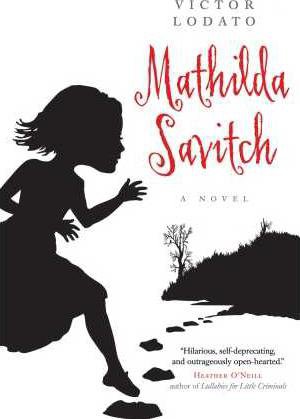‘Mathilda Savitch’
By: Victor Lodato
Price: $14 (paperback)
Rating: Three out of five bookmarks
"Mathilda Savitch" is the debut novel for playwright and poet Victor Lodato, where he introduces us to a young girl named Mathilda and her coming-of-age struggles.
Mathilda’s parents have been in a nearly comatose state for a year, ever since her older sister died in a train accident, so Mathilda decides she is going to shock her parents back to reality. How? By being "awful," as she says with pride, even wanting people to call her Lufwa, which is "awful" spelled backwards.
She also deals with her sprouting feelings of love and pre-teen sexuality, and slowly begins to discover unsettling truths she has been trying to mentally block since the death of her sister.
One of my goals in reading this book was to find out if an adult male author could effectively write from the perspective of a young girl. Lodato does manage to capture some of the typical pre-teen girl experiences and emotions: for one, Mathilda is a classic "daddy’s girl," in that she has always had tense feelings against her mother (who Mathilda believes had a deeper bond with her more attractive, personable sister) but she has undying devotion towards her father. Mathilda is also grappling with her romantic feelings toward the boy next door named Kevin, although she seems to have semi-romantic feelings towards her best friend Anna as well (at least, she thinks she does).
However, it still ultimately read as a male point of view trying to imagine how a young woman would think and act, and thus Mathilda did not feel completely real or genuine.
I believe another reason that some of the characters’ thought processes came across as strange is because of Lodato’s playwright side. I could visualize some of the conversations or setups working on a theater stage, much like some of the "experimental theater" I saw during college, but as a novel it seemed surreal — but maybe that was what Lodato was going for.
What mainly confused me about the novel was its concept of Mathilda acting badly in order to bring her parents back to reality. This would be an interesting plot if there was any indication that Mathilda had been a perfectly good daughter beforehand, and that her becoming "awful" would have been a shock. Yet the novel indicates otherwise; Mathilda had fights with her sister, and Mathilda said very hurtful things to her on the morning of the day her sister died.
Mathilda has always been butting heads with her mother, and she describes all of her classmates with derogatory observations, giving us insight as to why she pretty much has her one and only friend, Anna, who Mathilda considers dumb.
So why is her decision to act badly so surprising? I guess she is choosing to act even worse than before, but that makes the character even harder to identify with, and rather hard to root for.
I was at least satisfied with the outcome of events, including the final scenes of the book in which Mathilda (in her own odd way) shows compassion and makes choices that while not altogether honest, at least spare pain to those who have been experiencing heartbreak. I still think this story may have been more effective as a theatrical play, but I still recommend it for a quick read, even if just because it’s one of those kinds of novels that every reader will view differently, so it is bound to stir some interesting discussions.
Alison Reeger Cook is a Gainesville resident whose Off the Shelves book review appears every other week in Sunday Life. Know of a good book to review? E-mail her about it.

